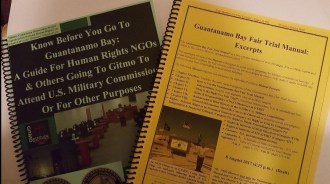
I am a Master of Laws (LL.M.) student at Indiana University McKinney School of Law in the International Human Rights Law track, and I am part of the Law School’s Military Commission Observation Project (or the Gitmo Observer), founded by Professor George Edwards. I am also a Brazilian judge since 2005.
From July 21 to 28, 2019, I traveled to Guantanamo Bay, Cuba, to monitor U.S. Military Commission hearings against Khalid Shaikh Mohammad, Walid Muhammad Salih Mubarek Bin ‘Attash, Ali Abdul Aziz Ali, Ramzi Bin al Shibh, and Mustafa Ahmed Adam al Hawsawi that are charged as being masterminds / facilitators of the 9/11 attacks on the World Trade Center and the Pentagon.

As I mentioned in my first post to Gitmo Observer, a Monitor / Observer traveling to Guantanamo Bay, I have the role to attend, observe, be seen, analyze, critique, and report my observations, “helping to ensure transparency, the rule of law, and /helping to ensure that the promises of international human rights law protections are fulfilled.”* (you can read at Guantanamo Bay Fair Trial Manual).


Besides, as a Brazilian judge, I feel obligated to share the information I learned with the legal community in Brazil and Latin America, who may benefit from learning about the Military Commissions. And this blog is about two recent experiences.
First, on September 11, 2019, I gave a lecture by videoconference to graduate students and master’s degree students of UniRitter, a Law School in Porto Alegre, Brazil, by the invitation of Professor Paulo Fayet.


Professor Fayet (Doctor in Criminal Sciences by the University Roma Tre, Italy, and a Professor of UniRitter’s Master Program) mentioned that “Judge Pereira’s lecture was a unique opportunity for the students of our institution to get to know the peculiarities of the Military Commissions in Guantanamo Bay.” He added that the in-depth approach of Judge Pereira brought new viewpoints to the students about this important topic of International Human Rights.”
Second, last November 6, I gave another lecture by videoconference to students of FADERGS, which is also a Law School in Porto Alegre, Brazil. This time I was invited by Professor Guilherme Antunes (Doctor of Laws by the University UNISINOS, Brazil and Director of the Master Program in FADERGS) and by Professor Tiago Castilhos (Master of Criminal Sciences and Doctor’s degree candidate at PUC/RS).
Professor Castilhos mentioned that “Judge’s Pereira lecture was one rare opportunity for the students to get to know in detail about the reality in Guantanamo Bay.” Professor Antunes said that “Brazilians have insufficient knowledge about the Military Commissions. So those reports brought by Judge Pereira, as part of the IU McKinney Military Commission Observation Project lead by Professor George Edwards, are essential for the world to be aware of what is happening in Guantanamo Bay.”


In Both lectures I brought the students details of the observer’s mission; explained how the attacks were planned based on the US Government’s charges against the alleged masterminds; described how the Military Commissions work; mentioned the issues concerning the “enhanced interrogation techniques” due process, judicial independence, and other issues related to the Commissions; and, finally, I described my week in Guantanamo Bay. The slides below are examples of what was shown to the students.



I will be finishing my LLM Program next December, and I intend to keep reporting my experiences in Guantanamo Bay in Brazil. As part of my mission, next year, I will present my experiences also to Brazilian Judges and lawyers to raise the awareness of the international community to the Military Commissions in Guantanamo Bay.
Daniel Pereira, International Human Rights LL.M. Candidate,
Military Commission Observation Project
Program in International Human Rights Law
Indiana University McKinney School of Law
* Edwards, George E., Guantanamo Bay Fair Trial Manual: An Independent & Objective Guide for Assessing Human Rights Protections and Interests of the Prosecution, the Defense, Victims & Victims’ Families, Witnesses, the Press, the Court, JTF-GTMO Detention Personnel, Other Detainees, NGO Observers and Other Military Commission Stakeholders” (by The Gitmo Observer – Principal Author George E. Edwards) © 2019., at. 10 (you can access the Manual here).








